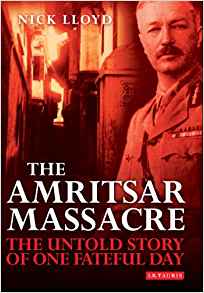Nick Lloyd is the author of the new book Passchendaele: The Lost Victory of World War I. His other books include Hundred Days and The Amritsar Massacre. He is Reader in Military & Imperial History in King's College, London, and he lives in Cheltenham, England.
Q: Why did you decide to focus in your new book on the
battle of Passchendaele, and why was it "the lost victory of World War
I"?
A: I decided to focus on Passchendaele because it is one of
the most iconic battles of World War One. It is commonly associated with mud
and terrible ground conditions, and I wanted to see whether the legends of the
battle were true. It is also a battle that has not attracted (somewhat
surprisingly) a great deal of historical scholarship - leaving me some room to
maneuver.
I argue that it is a “lost victory” because the scale of the
British attacks and how devastating they were to the German Army has never really
been recognized. We have been so concerned with the command errors and problems
on the British side that we have forgotten how difficult the fighting was for
the defenders.
Q: You begin the book with a quote from British officer Sir
Launcelot Kiggell. What is especially significant about this quote, and why did
you start with it?
A: I begin with the famous quote from Sir Launcelot Kiggell,
who (apparently) saw the battlefield and burst into tears, crying "Good
God, did we really send men to fight in that?" This quotation seems to sum
up the horror and futility of the battle and I wanted to examine whether it was
true, and if so, how could commanders be so ignorant of front-line conditions.
Q: How did you research this book, and what did you learn that
especially surprised you?
A: I spent time researching in archives across many
different countries, including the UK, Canada and Germany, trying to piece
together how the battle was fought and what it was like for those caught up in
it.
I think what I learnt was that the British were much more
effective on the battlefield than I had anticipated, and that had things been
done slightly differently, they could have won a major victory - what I have
referred to as a “lost victory.” The idea that the British had not adapted to
the demands of the Western Front, or that they could not fight effectively, is
simply not true.
Q: One hundred years later, what can we learn from this
battle?
A: We can learn many things from the Battle of
Passchendaele. The fighting shows the importance of innovation and adaptation
and understanding the enemy on their own terms. It also shows that when the
British tried to fight in a way that played to their strengths they were more
successful.
Moreover it is a battle that reveals the enduring importance
of good command and leadership; taking advice where necessary, encouraging
subordinates to be part of decision-making, and inculcating team spirit and
group working.
Q: What are you working on now?
A: I have a number of ideas at the moment for another book -
I will keep you posted!
--Interview with Deborah Kalb. For a previous Q&A with Nick Lloyd, please click here.




No comments:
Post a Comment